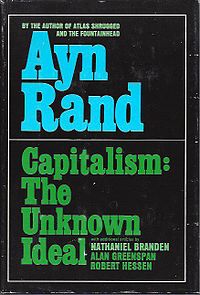Reason and values
Rand held capitalism to be the only moral social system, that is, one consistent with an objective theory of value and ethical individualism. According to Rand, the creation of wealth is a fusion of mind and matter, and she argued that reason is the most fundamental tool of survival for human beings; however, rational thought is rendered inoperative under conditions of compulsion, coercion, or as she puts it, the initiation of physical force. Whether it is the force of an armed robber or the force of a law, an actor's own judgment is rendered irrelevant to his actions by a threat of force, compelling him to act on the judgment or will of another, thus neutralizing the source of wealth and survival itself. Only voluntary trade can ensure that human interaction is mutually beneficial, and an analysis of history shows that only economic and political freedom has worked to create significant growth and economic development, precisely by liberating the rational faculties of ever wider numbers of individuals, according to Rand.
Individual rights
In its most basic form, the right to life (as understood by Rand) is the right of each human to do any and all activities necessary to sustain his or her own life. Rand further argued that one's selfish interests can never rationally entail the use of physical force or violence against the person or the property of another. Rand saw humans as thriving only as independent beings, reason being a faculty of the individual, with each freely expending their time, effort, and reason to sustain their own life.
Rand suggested that through the division of labor, specialization, and voluntary trade, other people are of enormous value to an individual. Moreover, knowledge, skills, and interests vary from human to human. One person may be better at shaping flint into arrowheads, another may have acquired the skill to turn mud into pottery. If the first wants a pot to cook in, he or she may trade an arrowhead for a pot. The central feature of free trade is that each participant judges that he or she has gained from the transaction.
According to Rand, when physical force is banned, persuasion alone can organize or coordinate human activity, and, consequently, the use of reason is both liberated and rewarded. The technological innovation which characterizes capitalist systems is thus directly related to conditions of economic freedom. A producer profits and becomes wealthy only by satisfying the voluntary choices of other market participants and in direct proportion to the value those participants find in transactions with that producer. In this way, individuals who themselves could have never invented, for example, the light bulb or the steam engine can nonetheless benefit from the creativity of others; this can be only ensured when both the innovator and the consumer are free to refuse the proposed trade. According to Rand, this is the mechanism behind America's rapid economic development, its liberation of human reason.
Freedom being the primary condition for the practical use of reason, the role of government in protecting individual rights is therefore fundamental, according to Rand, and it is equally fundamental that the government itself be limited to its role of protecting rights, for only by rendering all human interaction voluntary, i.e. free from the initiated coercion of criminals and laws, can the market operate to radically improve the lives of everyone. To the extent that it has been permitted to operate, this is what a free market has done, argued Rand. Thus, she held that "a free mind and a free market are corollaries".
